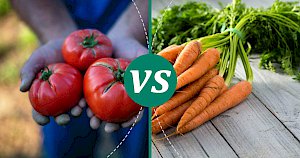Carrot vs Tomato: Nutrition & Calories Compare


Carrot vs Tomato
Nutrition Facts
Serving size:
change
5g10g15g20g30g40g50g60g80g100g120g140g160g180g200g220g250g300g350g400g450g500g600g700g800g900g1000g
1oz2oz3oz4oz5oz6oz7oz8oz10oz12oz15oz20oz25oz30oz35oz40oz50oz
Amount Per Serving:
Serving size:
change
5g10g15g20g30g40g50g60g80g100g120g140g160g180g200g220g250g300g350g400g450g500g600g700g800g900g1000g
1oz2oz3oz4oz5oz6oz7oz8oz10oz12oz15oz20oz25oz30oz35oz40oz50oz
Amount Per Serving:
Carrot vs Tomato 100g Compare
| per 100g | Carrot | Tomato |
|---|---|---|
| Calories | 41 | 18 |
| Carbohydrates | 9.58 g | 3.9 g |
| Fat | 0.24 g | 0.2 g |
| Dietary fiber | 2.8 g | 1.2 g |
| Protein | 0.93 g | 0.9 g |
| Calcium | 33 mg | 10 mg |
| Iron | 0.3 mg | 0.3 mg |
| Magnessium | 12 mg | 11 mg |
| Phosphorus | 35 mg | 24 mg |
| Potassium | 320 mg | 237 mg |
| Sodium | 69 mg | 5 mg |
| Zink | 0.24 mg | 0.17 mg |
| Vitaminium A | 16706 µg | 833 µg |
| Vitaminium B1 (Thiamine) | 0.066 mg | 0.037 mg |
| Vitaminium B3 (Niacin) | 0.983 mg | 0.594 mg |
| Vitaminium B6 | 0.138 mg | 0.08 mg |
| Vitaminium B9 (Folic acid) | 19 mg | 15 mg |
| Vitaminium C | 5.9 mg | 13 mg |
| Vitaminium K | 13.2 µg | 7.9 µg |
| Beta karoten | 8285 mg | 101 mg |
Delving Into the World of Carrots and Tomatoes
Both carrots and tomatoes are staples in kitchens around the globe, celebrated not only for their versatility and flavor but also for their nutritional benefits. Before we dive into the specifics of carrot vs tomato calories and nutrition, let's explore some interesting facts about these two vegetables (or, in the case of tomatoes, fruits technically) that you might not know.
Carrots, with their vibrant orange hue, are renowned for their high beta-carotene content, which the body converts into vitamin A. This essential nutrient is vital for good vision, skin health, and immune function. Interestingly, the original color of carrots was not orange; they were predominantly purple, white, or yellow until the 17th century when Dutch growers cultivated the orange variety we are familiar with today.
Tomatoes, on the other hand, were once believed to be poisonous in Europe due to their belonging to the nightshade family. It wasn't until the 19th century that tomatoes gained popularity in Europe and North America. They are now a fundamental component of various cuisines worldwide, prized for their lycopene content, a powerful antioxidant that has been linked to reduced risk of heart disease and cancer.
Comparing the Nutritional Profiles
When it comes to tomato vs carrot nutrition, both offer unique health benefits and have distinct nutritional profiles. Here's a closer look at how they compare:
- Calories: Carrots have 41 calories per 100 grams, whereas tomatoes contain only 18 calories. This makes tomatoes a lower-calorie option for those monitoring their calorie intake.
- Carbohydrates and Fiber: Carrots are higher in both carbohydrates and fiber, with 9.58 grams of carbs and 2.8 grams of fiber, compared to tomatoes' 3.9 grams of carbs and 1.2 grams of fiber. The higher fiber content in carrots can be beneficial for digestive health.
- Protein: Both vegetables have similar protein contents, with carrots at 0.93 grams and tomatoes at 0.9 grams per 100 grams. While they're not high in protein, they can contribute to your daily intake.
- Vitamins and Minerals: Carrots are an outstanding source of vitamin A, providing 16706 IU, significantly more than tomatoes' 833 IU. However, tomatoes offer more vitamin C, with 13 mg compared to carrots' 5.9 mg. Both vegetables provide a range of other vitamins and minerals, including potassium, magnesium, and iron.
What's Best for Your Diet?
The choice between carrot vs tomato depends on your dietary needs and preferences. If you're looking for a low-calorie option rich in vitamin C and lycopene, tomatoes are an excellent choice. On the other hand, if you're seeking a vegetable high in fiber and vitamin A, carrots are the way to go.
Ultimately, both carrots and tomatoes can be valuable additions to a balanced diet, offering a range of nutrients and health benefits. Whether you prefer them raw, cooked, or juiced, incorporating these vegetables into your meals can contribute to a healthy and varied diet.
Carrot 100g
41kcalCalories source
- 87% CARBS.
- 8% PROTEIN
- 5% FAT
Tomato 100g
18kcalCalories source
- 74% CARBS
- 17% PROTEIN
- 9% FAT
Compares of carrot
- Carrot vs Asparagus
- Carrot vs Beetroot
- Carrot vs Pepper
- Carrot vs Bitter Melon
- Carrot vs Broccoli
- Carrot vs Brussels Sprouts
- see all compares of carrot
Marcin Piotrowicz
calories-info.com creator
Healthy diet and healthy lifestyle promoter
Add comment